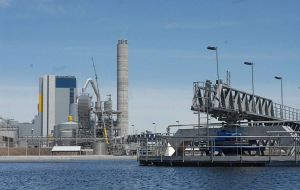MercoPress. South Atlantic News Agency
Uruguay/Argentina prepare for International Court ruling on bilateral dispute
 In a similar line Argentina has decided that the ruling next April 20 be transmitted live, in Spanish, to the whole country.
In a similar line Argentina has decided that the ruling next April 20 be transmitted live, in Spanish, to the whole country. A Uruguayan multi-party delegation will be present in The Hague next week when the International Court of Justice makes public its ruling on the Argentine/Uruguayan dispute over the construction of a pulp mill along shared waters.
In a similar line Argentina has decided that the ruling next April 20 be transmitted live, in Spanish, to the whole country.
The International Court ruling will decide on a demand presented by Argentina in 2006 claiming that Uruguay did not officially inform Buenos Aires on the construction of a pulp mill along the border river Uruguay as established in an agreement dating back to the seventies which refers to the joint managements of the water course.
Argentina is also demanding the Finnish built pulp mill be relocated for environmental conservation reasons.
The dispute has been aggravated by pickets, --firstly sponsored by the Argentine government but which now have become autonomous--, blocking an international bridge linking the neighbouring countries since 2006 and have promised to step up protests if The Hague does not rule the relocation of the Botnia plant.
Faced with this situation Uruguayan president Jose Mujica invited opposition political parties to send representatives to The Hague in support of the country’s delegation.
“It’s an idea of President Mujica to have all parties present. We have the support from the opposition parties that have considered the initiative very positive”, said Uruguayan Foreign Affairs minister Luis Almagro, head of negotiations.
“We need the broadest consensus possible. It’s very important to have this support which is part of the country’s international policy”, added Almagro.
The main opposition National party has named a former Foreign Affairs minister Sergio Abreu and the junior opposition Colorado party Senator Ope Pasquet, an expert in international affairs.
Almagro anticipated Uruguay will abide by the ruling, although “we will have to adapt our position to the overall international relations with Argentina”.
“We are working on all possible scenarios. Once the ruling is announced we’ll concentrate for a couple of hours before holding a press conference”, added Almagro.
As to the consequences of the ruling if it effectively condemns Uruguay for not having strictly adhered to the shared waters agreement, “we will take note and they will be very much present in future joint actions” said Almagro who recalled that Uruguay has always been most respectful of international law, agreements and treaties.
The Argentine Ministry of Foreign Affairs said that the ruling transmission will be aired by the official Argentina media with simultaneous translation.
“It is most important we all, I repeat we all understand what the Court has to say”, indicated Susana Ruiz Cerruti head of the Argentine delegation before the international tribunal.
The new Uruguayan administration under President Mujica had adopted a more flexible attitude towards the Argentine government, which is also willing to put an end to the several years dispute. However a more difficult nut to crack are pickets that have promised to continue if the ruling is not favourable.
Diplomatic sources have anticipated that the ruling could effectively indicate Uruguay did not comply with all the steps and procedures demanded by the shared waters agreement, but will not recommend a re-location of the plant.
It would rather suggest a common approach with both sides agreeing on terms for joint monitoring of the environment.
Uruguay under the previous administration of former president Vazquez said it was willing to negotiate with Argentina the Botnia plant, even the re-location, but first pickets must be lifted. This never happened because the administrations of the Kirchner couple argued they would not remove pickets by force, “Argentine citizens have a right to express freely”.




Top Comments
Disclaimer & comment rulesCommenting for this story is now closed.
If you have a Facebook account, become a fan and comment on our Facebook Page!